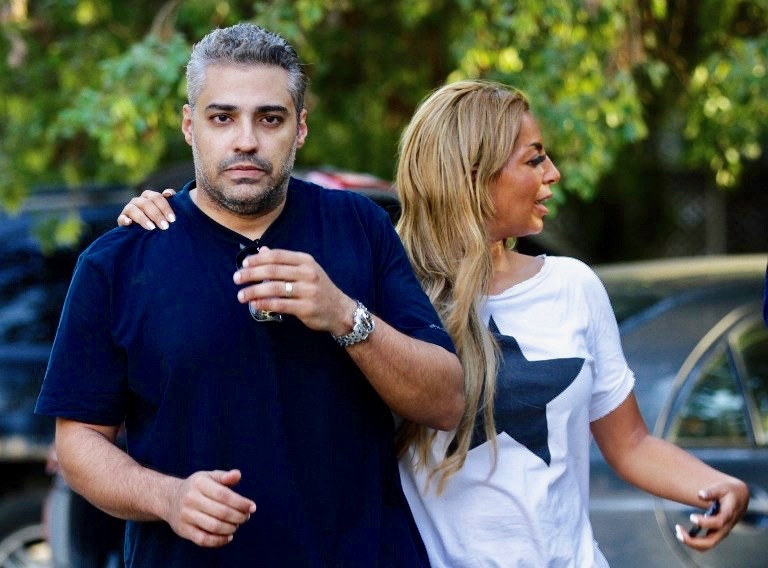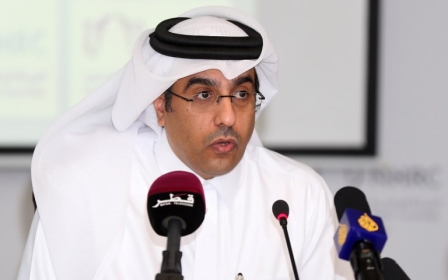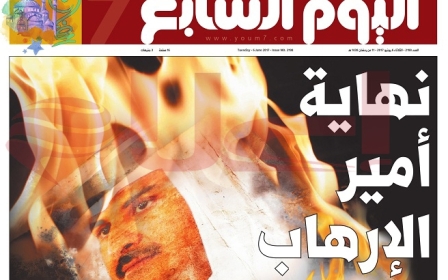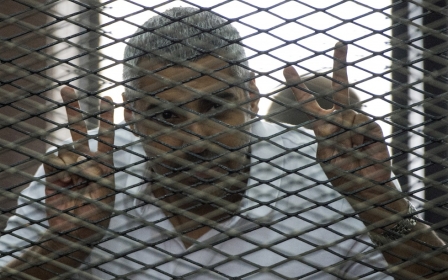Gulf crisis: Egyptian journalist joins former jailer's side

Egyptian journalist Mohamed Fahmy, who was working in Cairo for Al-Jazeera in 2013 when Egyptian authorities threw him in prison for more than a year, received significant funding from an Emirati official to start his legal battle against the network, the New York Times has reported.
The US newspaper reported on Saturday that Fahmy received a substantial loan from the UAE's ambassador to the US, Yousef al-Otaiba, to cover the costs of his legal campaign against the Qatar-funded broadcaster following his release from an Egyptian jail in 2015.
Fahmy, along with nine other colleagues, was imprisoned after being accused of spreading "false news" during coverage of the aftermath of the military overthrow of then-president Mohamed Morsi in 2013.
He spent more 437 days in jail after the sentencing judge said the journalists were brought together "by the devil" to destablise the country.
Less than two years after his release, Fahmy filed a lawsuit for more than $100m against his former former employers: Al Jazeera and Qatar, the New York Times reported.
In February 2015, Fahmy entered into correspondence with Otaiba who offered to arrange coverage on the UAE-based TV channel SkyNews Arabia, according to the report.
"SkyNews to take it live would be awesome, I think a nudge to their C.E.O. could make it happen," Fahmy wrote.
"Already done," Otaiba responded. "Let’s hope they can get there."
Fahmy, who is a Canadian citizen and lives in Vancouver, British Columbia, told the NYT that he had received what he described as a “loan” from Otaiba to finance his legal action against Qatar.
He added that the ambassador was a childhood friend and that the two had attended the same high school together in Egypt. He said he was one of several individuals who had provided him with financial support.
He also said that the money for the lawsuit had gone to a third party, whom Fahmy refused to identify. “I have not received a penny from Yousef,” he said.
Fahmy also used the interview with the Times to accuse Al-Jazeera and Qatar of “a systematic campaign to smear" his reputation after he first lodged a lawsuit against the broadcaster in Canada in May 2015.
He accused Al-Jazeera of negligence by misinforming him about its legal status in Egypt and for airing his reports on its Egyptian channel, which was banned by an Egyptian court for allegedly favouring the Muslim Brotherhood, the Guardian reported at the time. Al-Jazeera denied Fahmy’s allegations at the time.
Fahmy's case has seen him become a pawn in the on-going Gulf crisis that has pit Qatar against Saudi Arabia, Egypt, Bahrain, the United Arab Emirates and its regional clients.
Saudi Arabia announced on 5 June that the group was suspending all ties with Qatar, accusing it of support for extremist groups - a claim Doha denies.
They closed their airspace to Qatari carriers and blocked the emirate's only land border, a vital route for its food imports. They also ordered all Qataris to leave and their own nationals to return home.
Then Riyadh laid down a list of 13 demands for Qatar, including ending Doha's support for the Muslim Brotherhood, the closure of Al-Jazeera television, a downgrade of diplomatic ties with Iran and the shutdown of a Turkish military base in the emirate.
New MEE newsletter: Jerusalem Dispatch
Sign up to get the latest insights and analysis on Israel-Palestine, alongside Turkey Unpacked and other MEE newsletters
Middle East Eye delivers independent and unrivalled coverage and analysis of the Middle East, North Africa and beyond. To learn more about republishing this content and the associated fees, please fill out this form. More about MEE can be found here.





